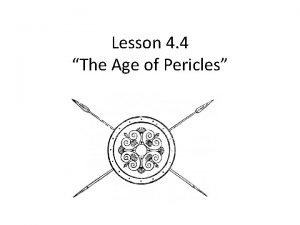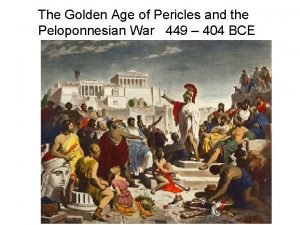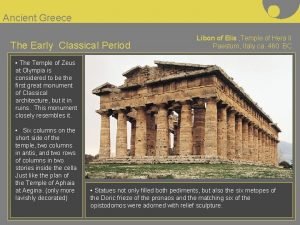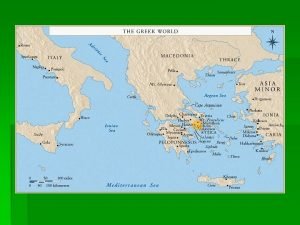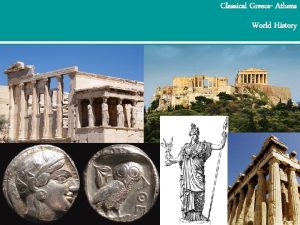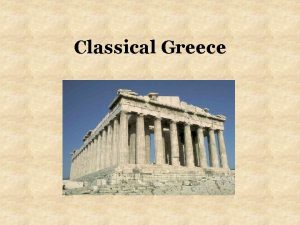Classical Greece Age of Pericles 1112022 1 The















- Slides: 15

Classical Greece Age of Pericles 1/11/2022 1

The Persian Wars • Persians conquered Lydia in 547 BC and annexed Ionia • Resentful of Persian-appointed tyrants, the Ionian cities revolted in 449 BC and established democracies • They appealed to the Athenians for aid to end the Persian threat forever • Athens sent twenty ships but to no avail • By 494 BC, Darius I had crushed the revolt, burning Miletus in revenge 1/11/2022 2

1/11/2022 3

Pericles • victory over the Persians exhilarated the Athenians and made them the leaders of the Greek world during the remainder of the fifth century BC. • During the Golden Age of Greece, the Athenians "attempted more and achieved more in a wider variety of fields than any nation great or small has ever attempted or achieved in a similar space of time. " 1/11/2022 4

Pericles • From 461 BC to 429 BC Pericles guided Athenian policy • Archons no longer had any power. The executive was now run by a board of ten generals • This board operated like a modern-day cabinet. The generals urged the popular assembly to adopt specific measures, and the success or failure of their policies determined whether they would be reelected at the end of their annual term 1/11/2022 5

Pericles • Pericles failed reelection only once and was so influential that Thucydides claimed "what was in name a democracy was virtually a government by its greatest citizen. " 1/11/2022 6

Athenian Society • The majority of the inhabitants of Athens were not recognized as citizens. • Women, slaves, and resident aliens were denied citizenship and had no voice in the government • Legally, women were first the property of their fathers, then of their husbands • They could not possess property in their own name or as the law stated, "make a contract about anything worth more than a bushel of barley. " 1/11/2022 7

Athenian Society • Athens was a man's world • A wife's function was to bear children and manage the home, where she was restricted to the women's quarters when her husband entertained his friend. • Men did not marry until they were about thirty, and they usually married girls half their age. • Marriages were normally arranged and prospective brides and bridegrooms seldom met before their wedding 1/11/2022 8

Athenian Society • Families were small • infanticide, usually by exposure, was practiced as a primitive form of birth control. The average life expectancy was little more than thirty years • Athenian society sanctioned a double moral standard, and the philandering of a husband was not made public 1/11/2022 9

Battle of Marathon 1/11/2022 • Darius knew that Persia’s position in Ionia was insecure as long as Athens remained free to agitate for revolt so …. • in 490 BC a Persian force sailed across the Aegean and debarked on the plain of Marathon near Athens • Darius' aim was to force the Athenians to accept the son of Pisistratus as their leader (he was pro Persia) • The battle of Marathon was one of the most decisive in history (check your notes) 10

Significance of Marathon 1. 2. 3. destroyed the belief in Persian invincibility and demonstrated that "free men fight better than slaves. “ (Herodotus) gave the Athenians the self-confidence that made Athens the leading Greek state Ten years later the Greeks were well prepared for a new Persian invasion under Xerxes 1/11/2022 11

Thermopylae • Herodotus wrote that 1 700 000 Persians fought there. Better estimate is 150 000. Why? – Persians had many ships but it is doubtful they could command that many men at sea • Check notes on Battle of Thermopylae • The Spartan dead were immortalized on a monument placed near the pass where they were betrayed – "Go tell the Spartans, you who pass us by, that here, obedient to their laws, we lie. " 1/11/2022 12

Thermopylae 1/11/2022 13

Salamis • After Thermopylae, the Persians burned Athens • in the Bay of Salamis the Greek fleet was victorious • Check notes on Salamis 1/11/2022 14

Aftermath of Salamis • Defeated and with most of his fleet destroyed, Xerxes returned to Persia but left a strong force in and around Greece • 479 BC, Greeks led by the Spartans routed the Persian force at Plataea, and Greece was for the time being safe from invasion 1/11/2022 15
 Describe the age of pericles
Describe the age of pericles How was democracy expanded during the age of pericles
How was democracy expanded during the age of pericles Peloponnesian war
Peloponnesian war During the age of pericles
During the age of pericles During the golden age of athens, male citizens
During the golden age of athens, male citizens Stone age chronology
Stone age chronology Iron age bronze age stone age timeline
Iron age bronze age stone age timeline Chapter 5 ancient greece
Chapter 5 ancient greece Farnese hercules
Farnese hercules Lesson 3 classical greece
Lesson 3 classical greece Cuna de pericles crucigrama
Cuna de pericles crucigrama Glory war and decline
Glory war and decline Triumvirate rome
Triumvirate rome Pericles legacy
Pericles legacy Peter pericles trifonas
Peter pericles trifonas Pericles accomplishments
Pericles accomplishments
